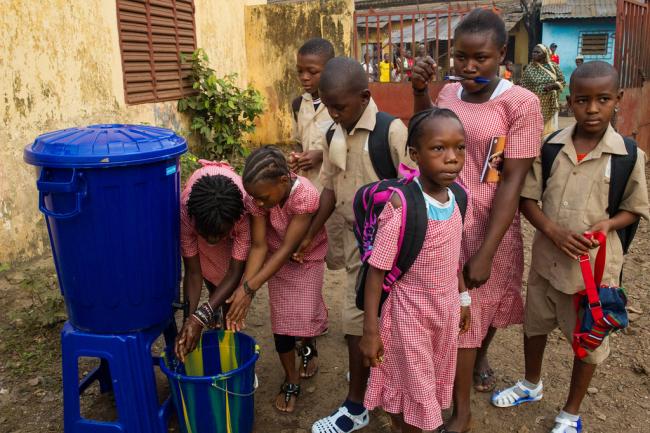
World Bank: Worst-affected countries 'crippled' by economic impact of Ebola
“As welcome as these latest signs are, we cannot afford to be complacent,” said Jim Yong Kim, President of the World Bank Group. “Until we have zero new Ebola cases, the risk of continued severe economic impact to the three countries and beyond remains unacceptably high.”
Despite transmission rates in the three worst-affected countries showing significant signs of slowing, the Bank expects around $1.6 billion of lost economic growth to be recorded in those States over the course of 2015, according to its report – The Economic Impact of Ebola on Sub-Saharan Africa: Updated Estimates for 2015 – released on Tuesday ahead of the 2015 World Economic Forum in Davos.
The report describes a four per cent fall over 2014 in the 11.3 per cent growth rate projected for Sierra Leone before the crisis. Guinea and Liberia are also expected to see large reductions, with the total fiscal impact for the three countries in 2014 topping $500 million, about five per cent of their combined Gross Domestic Product (GDP).
With investors steering clear, growth estimates for 2015 have also been revised down, the report notes. Guinea and Sierra Leone are expected to see their economies contract – by 0.2 per cent and two percent respectively – while predicted growth for Liberia has been reduced to three percent. Pre-Ebola growth estimates for 2015 in Guinea were 4.3 per cent; in Sierra Leone were 8.9 per cent; and in Liberia were 6.8 per cent.
That implies total forgone income in 2015 of around $1.6 billion, with around $500 million lost by Guinea, $900 million by Sierra Leone and $200 million by Liberia – more than 12 per cent of their combined gross domestic products (GDPs).
Despite its warnings, the new report revises the Bank's previous estimate of the probability of the epidemic's spread and the associated economic costs beyond the three most-affected countries.
Thanks in large part to the intensive global and national responses over the past several months, the projected downside scenario of $25 billion in economic losses for 2015 no longer applies. For sub-Saharan Africa as a whole, the range of downside risk extends from a low of $500 million to a high of $6.2 billion.
Region-wide losses could be closer to the report's higher end estimate of $6 billion if Ebola does spread beyond the three worst affected countries, while the minimum expected loss of $500 million is attributed to eroded consumer and investor confidence since the outbreak, as well as disruption to travel and cross-border trade.
Containment and preparedness efforts have dramatically limited the potential impact, as have public health improvements, such as safer burials, better detection, public awareness campaigns, more health workers and facilities, and better contact tracing. At the same time, neighbouring countries have contributed to reduced risk of spread across borders having adopted fast and effective containment measures.
“This report demonstrates why all countries should make investing in pandemic preparedness a top priority for 2015,” said Kim, noting that a major lesson from the outbreak is the need for much quicker global responses to disease outbreaks.
“It points to the need for a global pandemic emergency financing facility that will enable the world to respond much more quickly and effectively to any future deadly outbreaks, and avoid the tragic and unnecessary human and economic costs that have resulted from the Ebola epidemic.”
The Bank Group is mobilizing nearly US$1 billion in financing for the countries hardest hit by the Ebola crisis. This includes US$518 million from IDA for the epidemic response, and at least $450 million from IFC, a member of the World Bank Group, to enable trade, investment, and employment in Guinea, Liberia, and Sierra Leone.
Photo: UNMEER/Martine Perret
Support Our Journalism
We cannot do without you.. your contribution supports unbiased journalism
IBNS is not driven by any ism- not wokeism, not racism, not skewed secularism, not hyper right-wing or left liberal ideals, nor by any hardline religious beliefs or hyper nationalism. We want to serve you good old objective news, as they are. We do not judge or preach. We let people decide for themselves. We only try to present factual and well-sourced news.







